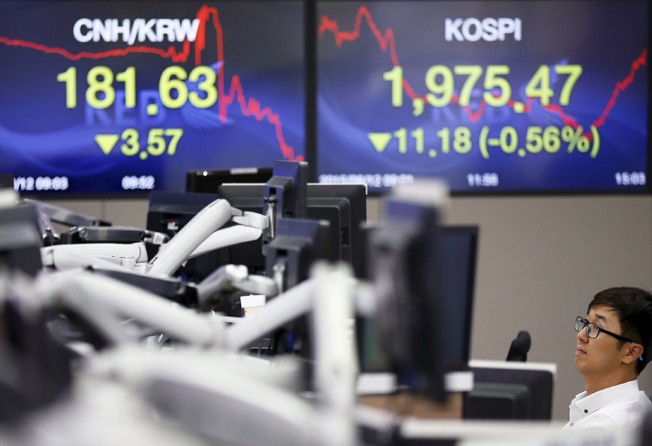Yuan devaluation rerun jolts markets, deepens fears China may further weaken currency
Beijing insists move is aimed at making the currency more market-oriented as tremors from shock policy change felt across the world

Beijing lowered the yuan again yesterday after a shock devaluation on Tuesday, roiling markets across the world and deepening fears of even more weakening of the currency.
The People's Bank of China (PBOC) cut the yuan's daily reference rate against the US dollar - or the midpoint around which it is allowed to rise or fall 2 per cent - by 1.62 per cent to 6.3306 yuan. This came after the central bank on Tuesday first surprised the markets by lowering the midpoint by 1.87 per cent.
The back-to-back devaluations have meant the yuan has lost nearly 4 per cent in two days. The currency plunged up to 2 per in Shanghai, before recouping about half the loss in the final 15 minutes of trading, raising suspicions that the central bank might have intervened to ensure a better close for today's rate fix.
Under a new currency mechanism to give market forces a greater play in determining the level of the yuan, Beijing has said the previous day's close, foreign exchange demand and supply, and the rates of other major currencies will from now on decide the daily rate around which the yuan can trade.
Two straight days of devaluation have got markets on the edge as many analysts are expecting more to come.
"There remains a large room for RMB's depreciation," ANZ said in a report.
Wang Yang, a Guotai Junan Securities analyst, agreed that the "one-off" devaluation, as Beijing claims it to be, has set in motion a fresh round of yuan depreciation. "But it will be gradual."
Some analysts and fund managers, however, said the PBOC may have drawn a line under depreciation.
"We do not think China will devalue again per se. By giving the market a bigger role, policymakers can simply chalk up any further currency weakness to market forces," said Win Thin, head of currency strategy at private bank Brown Brothers Harriman.
Standard Chartered analysts led by Eddie Cheung said the currency move would help the yuan to make it to the exclusive club of reserve currencies of the International Monetary Fund, which has said the yuan needs to be more market-oriented.
The IMF reacted positively to Beijing's currency moves, saying it could be a boon in the long run.
"The new mechanism for determining the central parity of the renminbi … appears a welcome step as it should allow market forces to have a greater role in determining the exchange rate," an IMF spokesman said in a statement.
But the markets appeared less upbeat. The Dow Jones Industrial Average lost 1.1 per cent in the opening hours, while the Standard & Poor's 500 index fell 0.9 per cent.
European and Asian indices were a sea of red, with Britain's FTSE 100 losing 1.72 per cent and Germany's DAX shedding 3.29 per cent. Closer to home, the Hang Seng Index lost 582.19 points and Singapore's Straits Times Index gave up nearly 3 per cent.
The immediate fear is that of a currency war in which other countries will weaken their currencies to protect their trading interests. Vietnam doubled the dong's trading band yesterday, weakening the currency by 1 per cent. The Korean won fell to its weakest level in almost four years, while the Taiwan dollar closed at its lowest in more than five years. Indonesia's rupiah and Malaysia's ringgit hit 17-year lows while the Australian and New Zealand dollars dropped to their lowest in six years.
The authorities in Beijing, however, tried to dispel such fears. The move was aimed to "better reflect market development in the exchange rate", said a Xinhua commentary.
"China has not devalued its currency on purpose to benefit its exporters at the expense of overseas competitors. The lower exchange rate is just a byproduct, not a goal," it said.